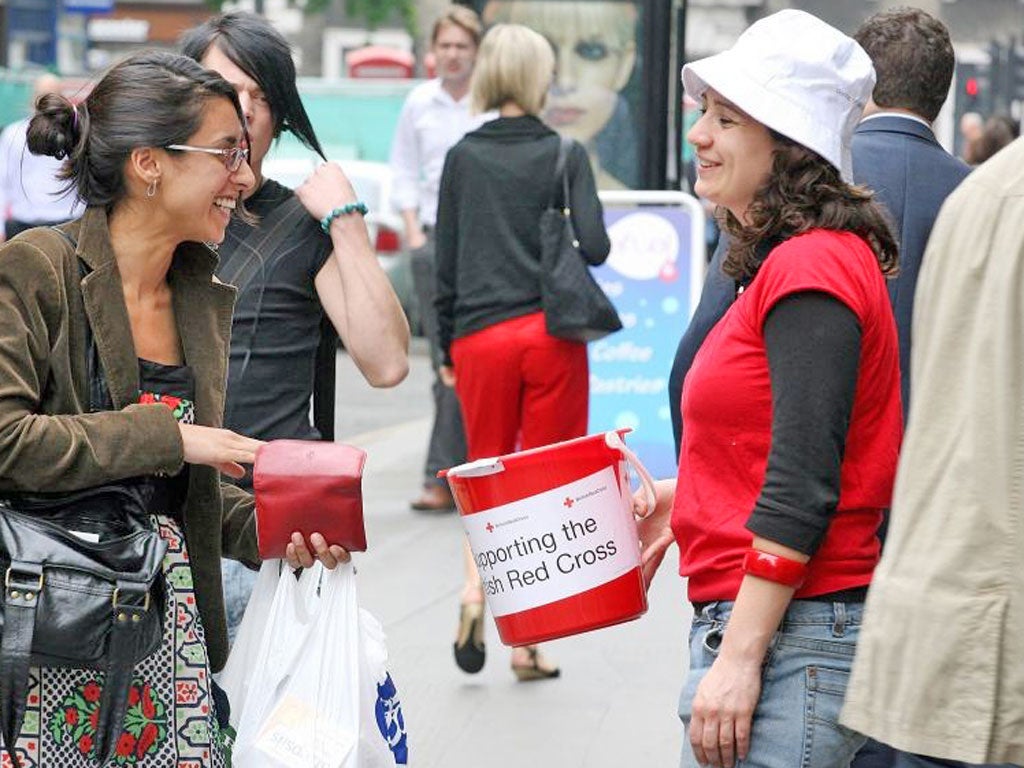If charities are going to survive in the 21st century, they can't rely on government alone
Only genuinely voluntary donations provide charities with funding that is sustainable over the long term. In times of austerity, charities find out the hard way

Your support helps us to tell the story
From reproductive rights to climate change to Big Tech, The Independent is on the ground when the story is developing. Whether it's investigating the financials of Elon Musk's pro-Trump PAC or producing our latest documentary, 'The A Word', which shines a light on the American women fighting for reproductive rights, we know how important it is to parse out the facts from the messaging.
At such a critical moment in US history, we need reporters on the ground. Your donation allows us to keep sending journalists to speak to both sides of the story.
The Independent is trusted by Americans across the entire political spectrum. And unlike many other quality news outlets, we choose not to lock Americans out of our reporting and analysis with paywalls. We believe quality journalism should be available to everyone, paid for by those who can afford it.
Your support makes all the difference.The definition of philanthropy is the love of one human being for another, which was for me the raison d’être for founding the charity SANE – to understand more about mental illness, provide help to those in need, and campaign for improved treatments and care. I soon realised that this was not an easy mission to sustain.
Charity can be as competitive as the commercial sector and as cut-throat in the fight for funds. The proliferation of charities – there are around 160,000 – and the rate at which they have scaled up into multinational operations means the original vision can become distorted or lost.
As the Lib Dem minister Lynne Featherstone tells independent.co.uk that charities should no longer depend on government for hand-outs, how does a charity raise enough funds to operate professionally and retain its integrity? And who should pay? Moreover, does the style and manner in which those funds are obtained matter?
At SANE, we believe it does. There is the temptation, for example, to outsource the acquisition of supporters through employing “chuggers” – which we have resisted. The difficulty is that the more commercialised the approach, the greater the distance between the donor and the recipients, compromising the bond of trust.
There is also the route of relying on government funding, where charities can become laced in a corset of contracts and obligations which not only may reduce their freedom to speak out but put them at risk of over-dependence in an economic downturn.
SANE decided to be a “David” rather than a “Goliath” charity and not depend on statutory funds but primarily to seek donations from charitable trusts, companies and individuals. Not a path for the faint-hearted, but it keeps a charity closer to its roots and, most important, its benefactors. For us, times have always been tough, especially as mental illness is an uncomfortable cause, and the latest findings from the Charities Aid Foundation – one in six charities fear they may close next year – are no surprise.
The trouble is that while society is dependent on the services charities provide, we do not have the same tradition of major donor-giving as in the US, and recent reports show that the sums and numbers of donations are falling. This is a crying shame at a time when cuts in frontline services are leaving more and more people bereft and adrift.
We believe it is no longer realistic to expect charities to fulfil all the roles of government agencies or global corporations, acting as a panacea for the world’s ills. We need to rediscover our creative edge, use the technologies available from social media to digital outreach, and learn to live on genuinely voluntary donations.
Join our commenting forum
Join thought-provoking conversations, follow other Independent readers and see their replies
Comments